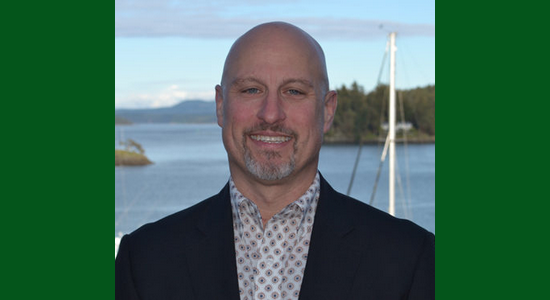— by Susan McBain, Orcas Issues reporter —
Nearing the achievement of one of its major responsibilities, the Orcas Island Health Care District (OIHCD) has reached agreement with UW Neighborhood Clinics (UWNC) on all aspects of their contract except one: the types and extent of after-hours care to be provided.
Agreement in that area looks closer too: UWNC is scheduled to have its proposals ready by April 1. Since the topic is complex and the proposals will require careful evaluation and discussion, the commissioners have decided to cancel their April 2 meeting and take up the topic at the April 16 meeting.
Communication with the community was another big topic of OIHCD’s March 19 meeting. The commissioners reviewed a draft Communications Strategy and Implementation Plan specifying how they hope to get information about the District and its activities out to the community. (A preliminary draft from January can be viewed here.) Among the ways are the District website, town halls, local news media, and social media. Commissioners Art Lange and Diane Boteler proposed several topics for articles that would be published on the District website and in the two local news vehicles, the Islands Sounder and Orcas Issues. The first will be an overall description of OIHCD’s responsibilities and what it has done since it began operating last May; as one observer noted, “You do way more than negotiate about after-hours care!” Other possible topics are the communications plan itself and how the public can participate; the specifics of after-hours care from both Orcas Family Health Center (OFHC) and UWNC, once UWNC’s contract is in place; and patient satisfaction results for both clinics.
Repairs and maintenance of the clinic building in which UWNC operates (which OIHCD now owns) will be a major expense, and the commissioners are taking time to understand all options. They hope to meet soon with a representative from Sustainable Connections, which focuses on energy efficiency, to update the energy assessment from 2016. Representatives from OPALCO and another energy consultant from Lopez Island will also attend. The goal is to better understand how the HVAC and roof systems interact in an effort to create an overall plan before moving forward on either project. The reroofing application has been approved by the County.
The commissioners also agreed they need to take a deeper look at financial data from both OFHC and UWNC in order to determine the best method for evaluating clinic performance. Actual data on how much subsidy per patient each clinic gets from the District visit are now available and do not match the estimates made last year. The commissioners agreed they need to better understand how each clinic categorizes expenses, what staffing levels are, and how expected numbers of annual patient visits are calculated.
Superintendent Anne Presson noted that the District’s website now has a link for filing complaints about insurers’ denials of coverage with the Office of the WA Insurance Commissioner (OIC). She also reported that the County Board of Health is expected to file a complaint with the OIC regarding Kaiser Permanente’s denials of coverage for emergency medical air transport.
The next OIHCD meeting is scheduled for April 16 at 4 p.m. at the Eastsound Fire Hall.
**If you are reading theOrcasonian for free, thank your fellow islanders. If you would like to support theOrcasonian CLICK HERE to set your modestly-priced, voluntary subscription. Otherwise, no worries; we’re happy to share with you.**








What will the agreement term be?
An agreement with UW is NOT one of the “major responsibilities” of the Orcas Island Health Care District (OIHCD); facilitating the provision of primary health is. If UW cannot satisfy the needs of the island residents, another entity can and should be found. The outstanding issue with UW happens to be the principal selling point used in the campaign for the OIHCD–after hours care–and it has dragged on for months.
Good Point, Peg.
Almost Where?
As Commissioner Dr. Boteler said at the last meeting: We need to decide ahead of time how we are to respond in the eventuality that UW never addresses the matter of after-hours care. Each Commissioner present verbalized assent to this. So this is where we stand.
It’s not complicated, it is difficult,
. . which is different, as any parent will tell you.
Here’s why.
The last year was a trial period for UW management who is auditioning for a job in a complex relationship providing a unique set of services to an isolated rural community with an aging population. The reporter is correct that this moment is fraught, but not for the reasons stated.
Healthcare boils down to two things: Advocacy and Access. A Primary Care Provider in our healthcare system, is designated quarterback for a complex team running a plan to carry your care downfield. You can see where this is heading. They are your personal advocate. Your advocate requires access to a broader range of specialists and services to coordinate your care with, and to provide essential sideline services, coordinated by a Coach. There are all kinds of coaching relationships.
Our relationship with UW has hampered our advocates from representing us and formalize the already established “strategy,” the Standard of Care on Orcas, avoiding a fumble. Not only has this created havoc with the relationship with the Commission, and the distraction of failing to close a contract timely, but it has impeded the integration of care with the other clinic, EMS and their off-island medical oversight and thus ultimately the area institutions we rely on. We are now in overtime.
Furthermore, After-hours/Primary-care [ONE service] shapes the demand for urgent/emergent services via all contributory community services that influence, and ameliorate, the course and severity of (your own) disease progression. We are all getting older. More of our health has Less to do with a quick check with our PCP than coordination with the myriad of specialists and paraprofessionals on the team. It’s a team, right?
UW management does not seem to be mindful of this. There is no agreement now that they could not have reached, on their own, ten months ago. And now that those ten months of aggravated futility replete with inappropriate silence, obfuscation and legalities are done, we are left to wonder, “What next?” Will it get any easier? We are just getting started, and this was the EASY part.
Is this the path to excellence?
Or a signpost to things to come.